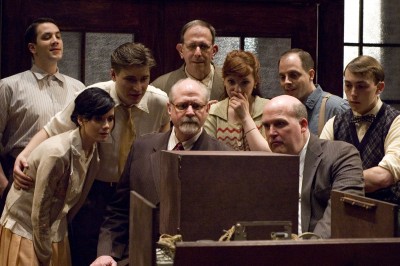John P. Marquand, So Little Time. All but forgotten today, this 1943 study of a disappointed playwright who married up and sold out is also a powerfully evocative snapshot of America on the eve of World War II. It’s not a great book by any means, and Marquand would work the same turf more effectively in Point of No Return and Women and Thomas Harrow, but I can’t think of another American novel that does a better job of suggesting what it felt like to watch the world sliding toward catastrophe (TT).
Archives for 2010
PLAY
That Face (City Center, closes June 27). No matter how suspicious you may be of prodigies, make an exception for Polly Stenham’s first play, a a tale of a grossly dysfunctional upper-middle-class family that she wrote when she was just nineteen years old. The New York premiere of That Face, presented by the Manhattan Theatre Club, is a superlative piece of work, staged with shrieking tautness by Sarah Benson and featuring memorable performances by Laila Robins and Cristin Milioti. Only time will tell whether Stenham has staying power, but this play bodes well for her future (TT).
DVD
Stagecoach (Criterion Collection). A “B” movie raised to the level of art by the impeccable direction of John Ford, this 1939 film defined the Hollywood Western and made John Wayne a star. Now it’s been remastered as handsomely as modern technology permits (the original negative no longer survives) and fitted out with all sorts of Criterion Collection-style extras. In any form, Stagecoach is a cinematic landmark–and one of the most purely enjoyable American films of the Thirties (TT).
TT: In memoriam
An excerpt from Percy Grainger’s Lincolnshire Posy, performed by the Bay Brass Ensemble at the Stanford University Memorial Church:
TT: Almanac
“It was horrible to think of a man so young and able dying so uselessly. In that moment Nellie found that war itself is understandable. It’s the things that go along with it, things that happen to people you know, that are incomprehensible, and have been in all ages.”
James A. Michener, Tales of the South Pacific
TOO MUCH OF A GREAT THING
“The world would doubtless be a poorer place if nobody could see Renoir’s ‘Luncheon of the Boating Party’ or listen to the Hallelujah Chorus for a full year. But imagine the effect that such a moratorium would have on our responses to those works come next May. Wouldn’t you like to be able to recapture the immediacy with which you first made the acquaintance of Charles Foster Kane once upon a half-remembered time?…”
TT: Where in the world are Terry and Mrs. T? (3)
Right here:

TT: Better than Broadway
Today’s Wall Street Journal drama column is the last of three consecutive reports about my most recent playgoing trip to Chicago. This week I review TimeLine Theater Company’s prouction of The Farnsworth Invention and Chicago Shakespeare’s Taming of the Shrew. Here’s an excerpt.
* * *
What is it that makes Chicagoland theater so special–and so different from theater in New York? If I had to sum it up in one sentence, I’d be stuck for words. If, on the other hand, I could send you to a show that embodies the differences between America’s two great theater towns, I might well pick TimeLine Theatre Company’s production of Aaron Sorkin’s “The Farnsworth Invention,” a play that didn’t fully convince me when I first saw it three years ago on Broadway but which I bought hook, line and sinker when I saw it again last week in Chicago.
 Mr. Sorkin’s play, which is now making the regional rounds, dramatizes the battle between Philo T. Farnsworth (Rob Fagin), the hayseed genius from Utah who more or less invented television, and David Sarnoff (PJ Powers), the ruthless boss of RCA, who sought to purloin Farnsworth’s patents and place the rights to TV under his well-manicured thumb. In Mr. Sorkin’s heavily fictionalized (and factually falsified) version, the Farnsworth-Sarnoff fight becomes a slickly effective morality play about corporate greed–or so, at any rate, it seemed when I saw Des McAnuff’s original production in 2007. Not so TimeLine’s spare, bare-bones staging, directed by Nick Bowling, which scrapes all the slickness off Mr. Sorkin’s script and infuses it with a surging physical vitality that knocked me off my feet….
Mr. Sorkin’s play, which is now making the regional rounds, dramatizes the battle between Philo T. Farnsworth (Rob Fagin), the hayseed genius from Utah who more or less invented television, and David Sarnoff (PJ Powers), the ruthless boss of RCA, who sought to purloin Farnsworth’s patents and place the rights to TV under his well-manicured thumb. In Mr. Sorkin’s heavily fictionalized (and factually falsified) version, the Farnsworth-Sarnoff fight becomes a slickly effective morality play about corporate greed–or so, at any rate, it seemed when I saw Des McAnuff’s original production in 2007. Not so TimeLine’s spare, bare-bones staging, directed by Nick Bowling, which scrapes all the slickness off Mr. Sorkin’s script and infuses it with a surging physical vitality that knocked me off my feet….
Save for “The Merchant of Venice,” “The Taming of the Shrew” is the least politically correct of Shakespeare’s plays, and the one that makes directors squirm most uncomfortably when they try to render it palatable to present-day audiences. Now Chicago Shakespeare is putting on a production directed by Josie Rourke that seeks to accomplish that feat in a striking new way: Playwright Neil LaBute has wrapped a “frame” around the play that offers an up-to-the-minute take on Shakespeare’s old-fashioned portrayal of the war between the sexes. In the Rourke-LaBute version, we’re present at the final rehearsals for a production of “The Taming of the Shrew” whose director (Mary Beth Fisher) is feuding with her girlfriend (Bianca Amato), a hot-blooded actress with a wandering eye who happens to be playing Kate, the proto-feminist hellion whom Petruchio (Ian Bedford) is resolved to subdue and wed. Not surprisingly, all hell breaks loose backstage–some of which makes its way onstage.
Not only is this “Kiss Me, Kate”-like concept executed with unexpected comic deftness by Mr. LaBute, whom no one has ever accused of having a feathery touch, but Ms. Rourke’s well-cast mounting of the play proper is bold, bawdy and bluntly funny. Therein lies the catch: The two halves of the show don’t need one another. I kept wishing that Mr. LaBute had written a full-length backstage farce à la “Noises Off,” and I couldn’t quite shake the feeling that he and Ms. Rourke were somehow apologizing for the fact that her vibrantly traditional staging of Shakespeare’s play is so satisfying in its own right….
* * *
Read the whole thing here.
